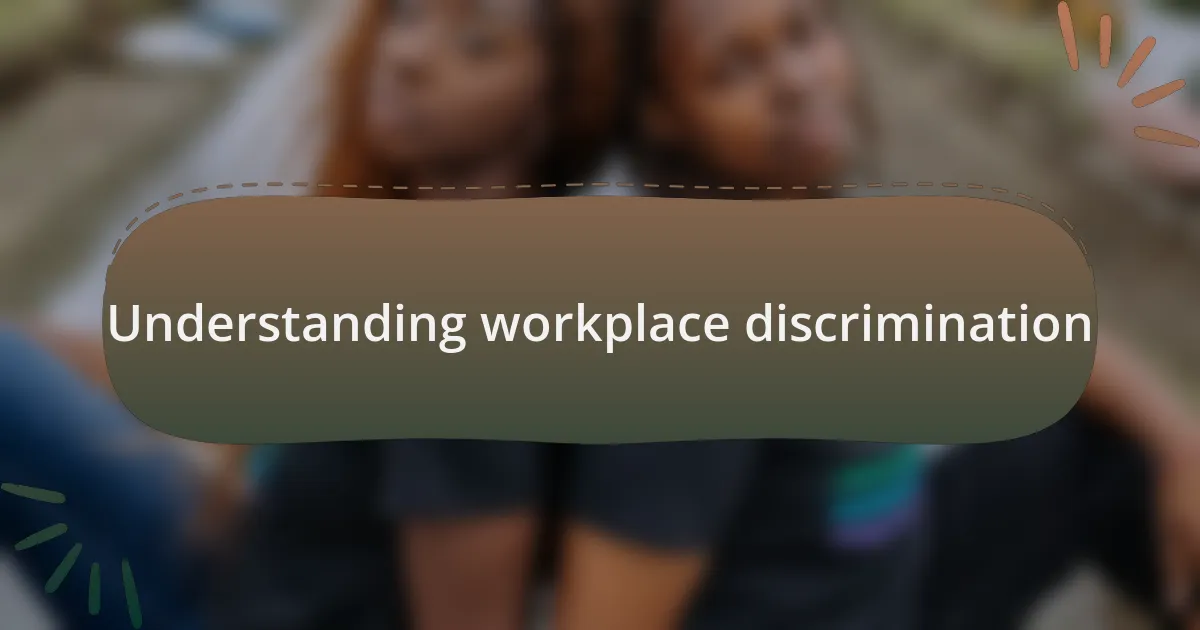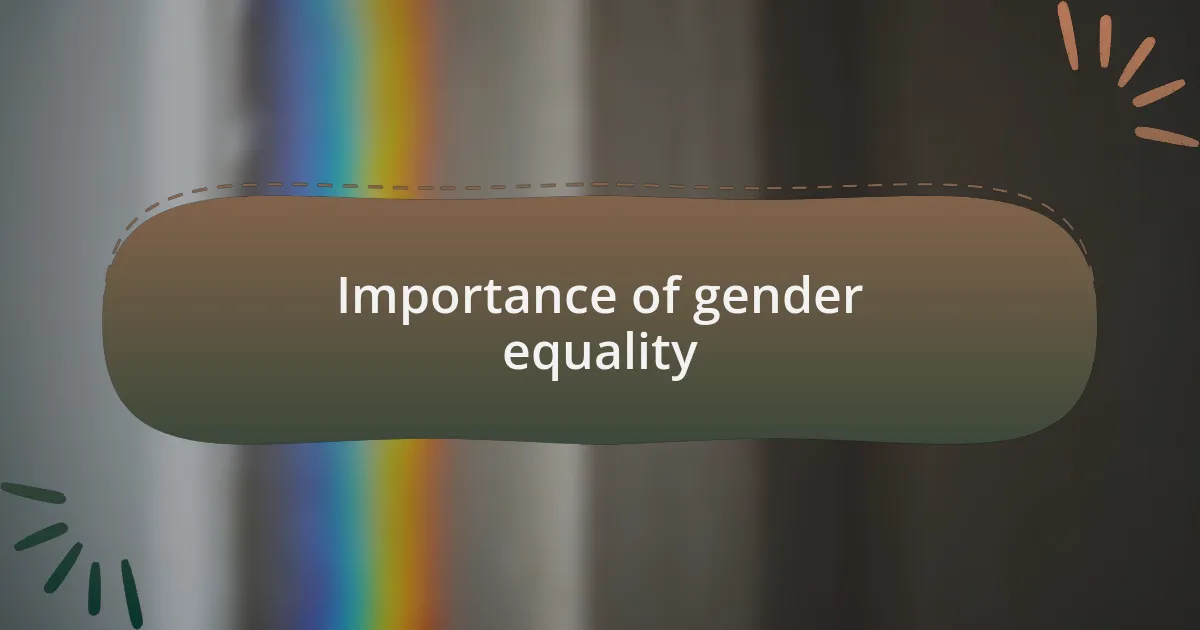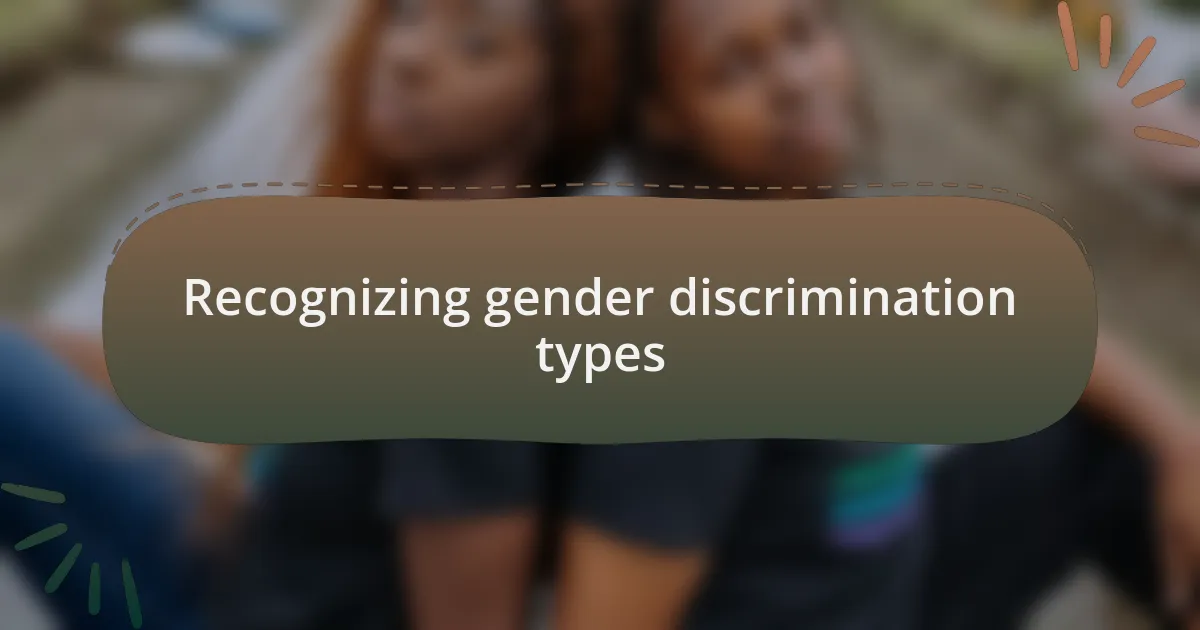Key takeaways:
- Workplace discrimination can be both overt and subtle, significantly impacting individuals’ self-esteem and career progression.
- Gender equality enhances workplace innovation, employee morale, and overall organizational success.
- Recognizing different types of discrimination, including systemic and microaggressions, is crucial for fostering inclusivity.
- Supporting colleagues through allyship, open dialogue, and advocacy can help create a more equitable workplace culture.

Understanding workplace discrimination
Workplace discrimination can manifest in various forms, often leaving those affected feeling isolated and unheard. I remember one instance when a male colleague was promoted over several qualified female candidates, including myself, simply because he was perceived to be more assertive. It made me question how often skill and merit are overshadowed by outdated gender norms.
As I continued to navigate my career, I observed how subtle biases could creep into everyday interactions, like people underestimating my contributions in meetings. It’s disheartening to think that a simple dynamic—like speaking over someone or not making eye contact—can signal that their input is less valued. Have you ever noticed this pattern in your workplace? Recognizing these behaviors is the first step toward changing them.
Even more troubling is the emotional toll that such discrimination can take on individuals. I’ve spoken with colleagues who felt they had to constantly prove their worth, leading to burnout and self-doubt. When did we allow our professional environments to dictate our self-esteem? Understanding this reality is crucial for fostering a workplace where everyone feels empowered to thrive.

Importance of gender equality
Gender equality isn’t just a moral obligation; it’s a catalyst for a thriving workplace. When everyone—regardless of gender—is given the same opportunities, innovation flourishes. I often reflect on the diverse teams I’ve been part of, where varied perspectives led to richer ideas and solutions. Have you ever found that a mix of viewpoints enhanced a project you were working on?
In my experience, gender equality can drastically improve employee morale. I’ve seen how workplaces that embrace equality tend to have higher job satisfaction and lower turnover rates. It’s as if the atmosphere becomes charged with positivity when everyone feels valued and respected. How powerful would it be to work in an environment where everyone is encouraged to share their voice?
Moreover, equitable workplaces contribute significantly to the overall success of an organization. Sales teams I’ve been part of, focused on inclusivity, frequently outperformed competitors, illustrating the tangible benefits of gender diversity. Isn’t it fascinating how intertwining gender equality with business strategy can lead to mutual growth? It proves that when businesses prioritize equality, they not only do the right thing but also do well economically.

Recognizing gender discrimination types
Recognizing gender discrimination types is crucial for fostering an inclusive environment. One of the most obvious forms is overt discrimination, where individuals experience unequal treatment based on their gender explicitly. I remember a colleague who was passed over for a promotion purely because of her gender; it was heartbreaking to see her talent go unrecognized. Have you ever witnessed such blatant disregard for someone’s contributions?
Subtle forms of discrimination often lurk beneath the surface, manifesting in microaggressions or unconscious biases. These are less visible but can be just as damaging. I once attended a meeting where a male colleague continually interrupted his female peers, diminishing their ideas and contributions. It was frustrating to see, yet many might overlook these incidents as ‘just the way things are.’ Don’t we owe it to ourselves to call these out?
Finally, there’s systemic discrimination, where policies and organizational cultures disadvantage one gender over others. In my own experience, I’ve encountered workplace policies that seemed neutral but inadvertently favored men, such as networking events scheduled during times when many women (who generally handle more family responsibilities) were unavailable. Recognizing these patterns is essential in order to advocate for meaningful change, isn’t it?

Personal experiences with discrimination
I recall a time when I was in a job interview and felt the interviewer shift the focus to my family plans instead of my qualifications. It left me feeling sidelined. Why should my personal life overshadow my professional abilities? This experience highlighted that discrimination can creep in during the most pivotal moments, shaping perceptions and opportunities.
Another instance that resonates with me occurred during a team project. While I led the group, my ideas were often met with skepticism and dismissed, especially in contrast to the same ideas proposed by my male teammate later on. I couldn’t help but wonder: did they really believe his insights simply because he was a man? It was disheartening to witness the different standards people seemed held to; the implications were painfully clear.
Then there was the time I navigated a workplace culture that subtly marginalized women. Casual conversations often veered toward sports and male interests, leaving me feeling excluded from the social bonds that naturally formed. Isn’t it disconcerting that these small interactions can build barriers that feel insurmountable? Such moments cultivate an environment where women may hesitate to voice their ideas, reinforcing the very discrimination we strive to dismantle.

Strategies for addressing discrimination
One effective strategy I found was actively seeking allyship within the workplace. I remember reaching out to a colleague who understood the subtle ways discrimination manifested. Together, we brainstormed ways to highlight each other’s contributions during meetings, creating a support system that made our voices harder to overlook. Isn’t it powerful when we lift each other up?
Another vital approach is fostering open dialogue about discrimination. I once proposed a workshop on unconscious bias in my office, encouraging my colleagues to reflect on their own experiences. It was enlightening to see how many shared similar stories, creating a bond and a collective desire for change. How often do we miss opportunities to discuss these crucial issues simply because they feel uncomfortable?
Additionally, documenting instances of discrimination has proven beneficial for me. Keeping detailed notes about specific events helped me understand patterns and brought clarity when discussing these issues with management. It’s surprising how empowering it feels to articulate my experiences with concrete examples. Isn’t it interesting how often the facts can speak louder than feelings in navigating these difficult conversations?

Supporting others facing discrimination
When it comes to supporting others facing discrimination, I’ve discovered the importance of simply being there. I once stood alongside a coworker during a tense meeting, where their contributions were overlooked. I made it a point to affirm their ideas loudly and clearly, not just in that moment, but consistently afterward. Can you imagine how empowering it felt for both of us? It reinforced our camaraderie and reminded them that their voice mattered.
Empathy plays a significant role as well. I learned this lesson when a friend confided in me about feeling marginalized in their role. Listening actively, I shared my own experiences with discrimination, which often helped us find parallels in our journeys. I’ve found that when we acknowledge each other’s struggles, we create an environment where no one feels alone. Have you ever felt the weight lift just by sharing your story with someone who understands?
Creating a culture of advocacy is also essential. I encouraged my team to participate in awareness campaigns, which not only amplified our voices but also brought us closer together. The commitment we showed to each other was evident when we attended events as a group, proudly joining forces to support those still facing challenges. Isn’t it incredible how a united front can spark meaningful change?